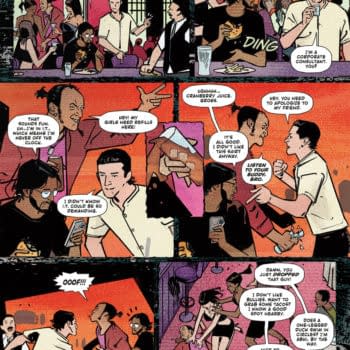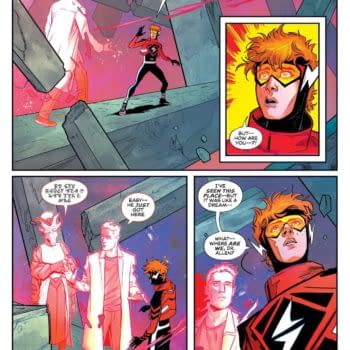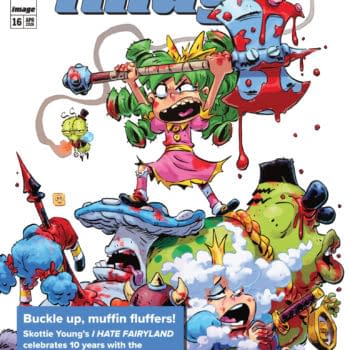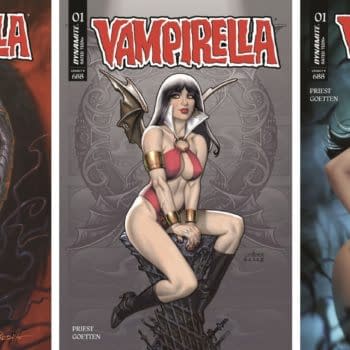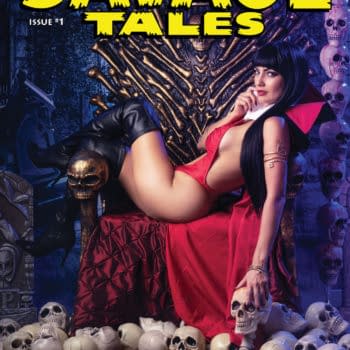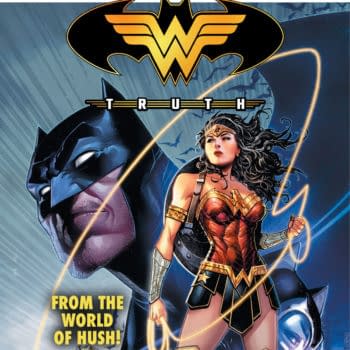Posted in: Comics, Recent Updates | Tagged: Comics, dan jurgens, dc comics, entertainment, geoff johns, grant morrison, J.M. DeMatteis, Justice league 3000, Justice League America, keith giffen, steve ditko, Ted Kord, The Blue Beetle, The Multiversity: Pax Americana
Celebrating Ted Kord, The Blue Beetle Who Was Your Friend
By Hilton Collins

Ted Kord became a fan-favorite character for a few big reasons, and the tremendous love for the character is why creators keep bringing him back, in one form or another.
Before I continue, I must admit… I like Jaime Reyes, the newest Blue Beetle, who debuted in the Infinite Crisis miniseries in 2006. He's an interesting person with a nice mystical / cosmic suit of armor look and power set thing going on. He's capable in fights, he's not an ass (at least not in the comics I've read), and there's really nothing about him I've noticed that would sour him in my eyes.
Jaime's the most recent person to carry the Blue Beetle title. He replaced Ted after the elder Beetle's death, a tragic, well-written departure. Jaime debuted as a teenager whom DC likely designed to be more marketable to younger audiences, and the fact that he wears armor with a blue scarab-like motif means there are all kinds of toy and action figure tie-ins companies sell with him. His creation makes sense from a business standpoint, and I can see why DC created him.
So, like I said, I like the current Blue Beetle well enough…
But sometimes, I miss Ted Kord.

Nothing was ever the same again.
These new people, the Justice League, fought these weird guys called the Royal Flush Gang, supervillains dressed like playing cards. The Leaguers argued, they had interesting personalities, some of them were down on their luck (oh, the DRAMA), and they got together again to fight the bad guys. I was intrigued, so I started buying Justice League America and Justice League Europe. At the time, Dan Jurgens wrote and drew Justice League America, and I was impressed by his action-packed adventure stories.

It wasn't too long after that I started collecting Justice League back issues while I read the current stuff. I read League adventures in the Gerry Conway era and the Keith Giffen and J.M. DeMatteis eras, and I discovered that there actually WAS a world outside of Marvel Comics, and it was a great one.
I learned that, before he joined the Justice League, Ted Kord had been a genius inventor and gifted athlete in his early days. He engineered his own bug-shaped blue aircraft and a strange pistol that emitted light. He fought crime hands-on, jumping, punching, and kicking the bad guys with a gymnast's flair. He started his own tech company, Kord Industries, and became wealthy (though he would lose most of his fortune in later DC storylines). Ted's Blue Beetle was a scientist adventurer who left his lab for danger and excitement. He accomplished all these things before he even JOINED the Justice League, so they're a part of the root of his character.
I also noticed that Ted Kord seemed to have a few things in common with Spider-Man. He had an insect-inspired motif, he was highly intelligent, and he hid insecurities behind wisecracks. He also used his athletic prowess, just like Spider-Man did, but Ted also seemed to have a bit in common with Batman. He was a rich businessman and inventor who used gadgets and weaponry, and he was athletic. Ted Kord's creator, Steve Ditko, was inspired by more famous superheroes, but Ted became his own superhero in time.
Ted grew more endearing as I dived into more Justice League back issues. I learned he had a weight problem, that he'd been even MORE underestimated in the 1980′s than he was in the 1990′s, that he hatched all of these weird get-rich-quick schemes, and that he was the butt of jokes just as often as he made them. And a lot of it was his fault. He didn't want to be treated like a clown, but he acted like one, so what did he expect? And if he didn't want to have a big belly, maybe he could've eaten better and exercised more.

I learned that, on some level, Ted Kord's shortcomings stemmed from his own faults. On the plus side, he was brilliant. He had started his own tech company and built impressive gadgets, and he was a very good hand-to-hand combatant. But he let his gifts flounder at times. He apparently never worked on his own company that much (being a superhero was cooler, anyway), which was his own choice, and he must've missed workouts to gain so much weight. And he certainly had no one to blame but himself for his juvenile antics.
But these things may have been why we liked him. How many of us comic book readers are thought of as nerds and goofballs at work or in school? And how many of us spend more time reading or playing games (be they console, computer, tabletop, or card games) when we could be playing sports or going to the gym? And how many of us are often underestimated and derided by others specifically because of who we are?
I'm not saying Ted was into D&D or WoW or anything (but who knows? Maybe he WAS); I'm just saying that he was definitely a nerd, at least on some level, and that was a big part of his character. Many of us may have, subconsciously, taken a liking to him for that reason. That may have been why I did, anyway.

Ted proved his worth in-panel and in our hearts and minds thanks to great writing by Giffen, DeMatteis, and Jurgens. We knew it, and so did DC, which is why it sucked when the company killed Ted off in Countdown to Infinite Crisis. Here's my theory on why he was sacrificed. Ted wasn't a household name hero, so most people in the general public wouldn't have stormed DC's gates for the killing, but he was well-liked enough by enough of DC's longtime readers that his death would be sad and heartbreaking. Ted was "just right," so to speak, for a death that would be tragic enough to be moving without being catastrophic for the company, so DC made one of the most gut-wrenching decisions in comics and murdered him.
In summary, poor Ted went out like this: He discovers that someone's stealing money from his company and that whoever's behind it is a threat to the League. He tells other superheroes, but most of them dismiss his concerns, sometimes rudely (except for Wonder Woman, because she's awesome, who tells him she'll help him out if he needs it. Why he DIDN'T take her up on her offer is beyond me). Anyhow, Booster Gold, Ted's best friend, agrees to assist in the investigation, but an explosion incapacitates along the way, so Ted goes it alone.

I was stunned as hell when I read it. I figured that Ted would be around forever, flitting in and out of comic book limbo to go on League adventures. But nope, he had to go, Greek tragedy style. Oddly enough, although I was sad, I wasn't really angry, and I think it's because the writing was so good. Ted went out, but he went out a hero, a SUPERHERO, dammit, and it was deep. He didn't go out crying or begging for his life, and he didn't go out a weakling. Yes, he lost, but strangely, he didn't seem helpless or pathetic. You can tell DC knew they had an awesome character because they had him go out respectably.
So here's to Ted Kord, the inimitable Blue Beetle, one of the intellectual crime fighting greats. He was brilliant without being untouchable, admirable without being unapproachable, and a non-powered superhero who remained interesting human among superhumans. Ted Kord was the hero who was your friend: someone you could identify with, and he fought the same kind of larger-than-life adversaries the other guys did who got all the glory. He was the wonderful underdog, and we're better off for having known him.
Last month was Thanksgiving, and I'm thankful that I got to know Ted Kord: The Blue Beetle who was my buddy.
Writer and videographer Hilton Collins loves sci-fi and fantasy wherever he finds it, whether it's in comic books, movies, books, short stories, TV shows, or video games. On the video side, he studies filmmaking, motion graphics, and animation; and on the writing side, he covers what he loves for Bleeding Cool and on his own blog, Imagination Unplugged (www.imaginationunplugged.com), a website about entertainment and self-help for creative professionals. He is @HiltonCollins on Twitter.










